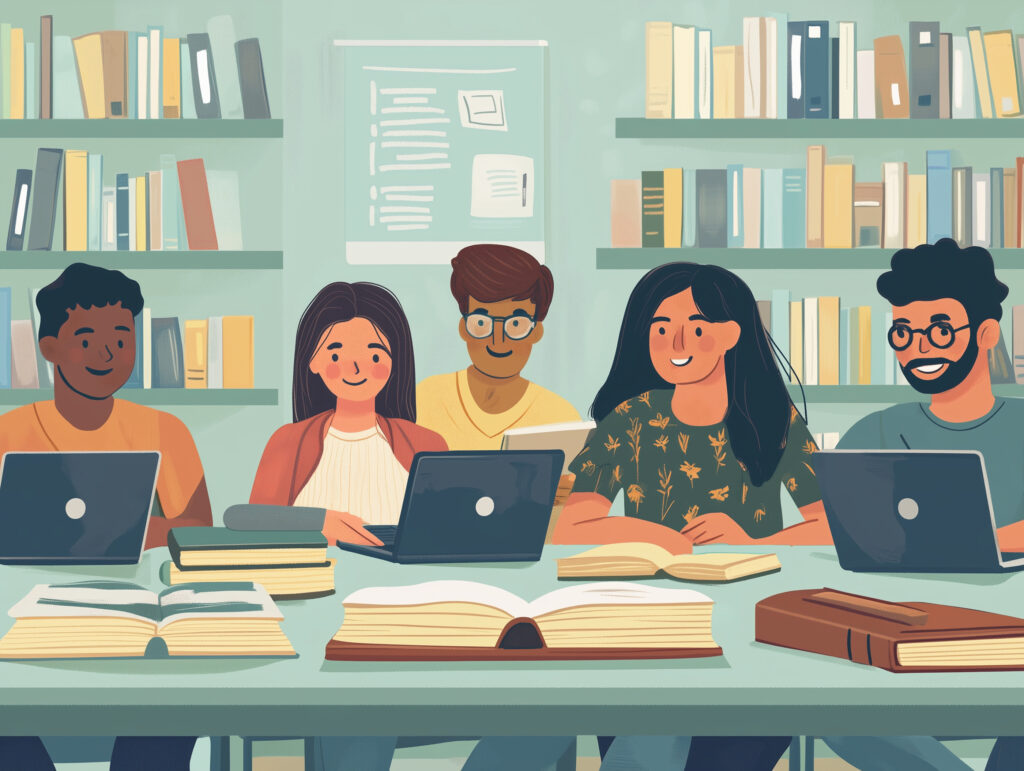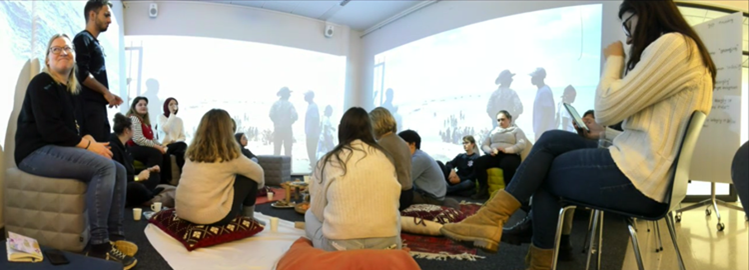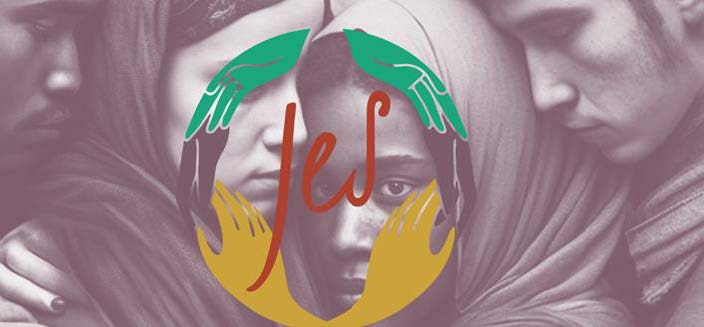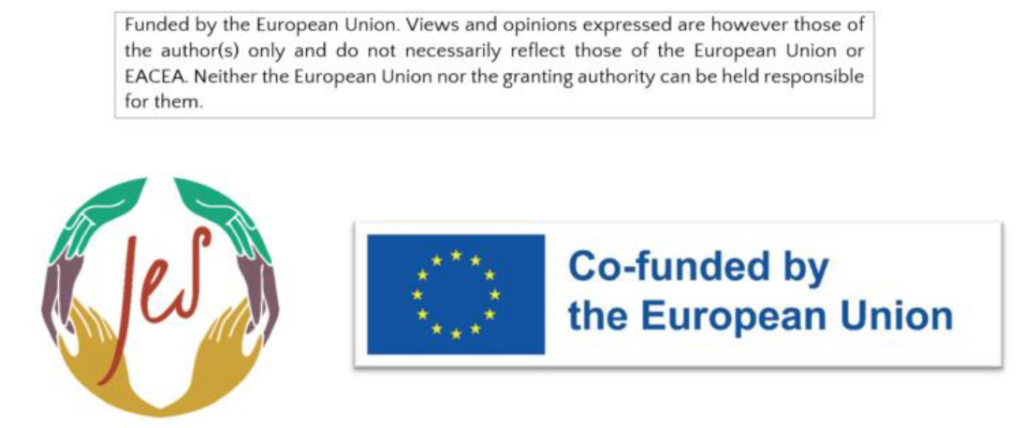Laurea UAS with its six campuses, about 9900 students, 660 staff members and 34 700 alumni is a powerful community for education and RDI activities in sustainable and versatile social and health care, coherent security, service business and circular economy, entrepreneurship as well as pedagogical co-creation. However, at times, in the hectic everyday campus life, it is not so easy to create a space where all the necessary pieces fall into place and the RDI activities can successfully meet with the ongoing teaching and other educational activities. However, when this happens, it is obvious that students can greatly enhance and enliven the Laurea RDI activities and such co-operation naturally also benefits students’ overall competence development. In this article, one example, namely that of the Erasmus+ project JeS (Joint eStories: Journeys from Fear to Fair), is discussed.
 Photo by tisomboon / Adobe Stock (Laurea Education Licence)
Photo by tisomboon / Adobe Stock (Laurea Education Licence)
Erasmus+ project JeS (Joint eStories: Journeys from Fear to Fair) in short
The Erasmus+ JeS Project (Joint Stories: Journeys from Fear to Fair, 2023-2025) focuses on the social responsibility of the higher education institutions (HEIs) (and also NGOs, non-governmental organisations) to promote human rights and the awareness of the urgent European challenges that hinder the realization of these human rights, such as trafficking in humans, forced labour, the vulnerable situation with undocumented migrants and the need for fair trade policies and better and safer working conditions. The goal is that European HEIs would give space in their multidisciplinary curricula to the voices of those individuals within the EU whose stories and voices are often excluded from the main social narrative. (JeS Homepage)
With its European partners from Italy (CESIE), Spain (INCOMA), Slovenia (University of Maribor), Belgium (UCLeuven and European Migrant Platform) and Finland (Laurea UAS), JeS focuses on co-creating an innovative and open digital learning environment, with digital eStories. In this way, JeS wishes to facilitate educational cooperation between European HEIs and NGOs, teachers, educators, students and migrants for shared learning, educational events, and workshops. With such activities, JeS intends to promote genuine dialogue and intercultural encounters and make the above-mentioned human rights situations in Europe visible and more tangible as well as included in higher education and other educational activities. (JeS Homepage)
Laurea students as junior researchers in Erasmus+ JeS
Following the previous Laurea examples of RDI and education integration with international projects, such as UNICAC – University Cooperation Framework for Knowledge Transfer in Central Asia and China, 2019–2022; DISC – Digital Skills for Integration and Active Citizenship, 2019–2022 and ILO – International Learning Online, 2022–2023 (see Wikström 2022), the Erasmus+ project JeS has also wanted to engage students in the JeS RDI activities, hence both Bachelor and Master students from Laurea have participated in the JeS project since its beginning. In addition to developing the different Laurea working life competences (Laurea pedagogical programme 2023-2025), such as working in diverse networks, promoting one’s international and societal skills and intercultural co-operation abilities, the participating students have received certificates for their active EU project participation as junior researchers, thus advancing their CVs as well.
 Picture 1. Multisensory Story Sharing Week at Laurea Multisensory Space.
Picture 1. Multisensory Story Sharing Week at Laurea Multisensory Space.
Few examples of the student based RDI activities so far are listed below.
- In autumn 2023, 19 Laurea and exchange students (especially from social services and nursing programmes) from different parts of the world participated as junior researchers in the multidisciplinary Bachelor course Intercultural and Multiprofessional Competencies (5 ECTS) out of which the students conducted a 2-ECTS research or creative methods -based project work related to Erasmus+ project JeS. Students could choose to write a research-based blog on the JeS themes (such as victimization and trafficking in human beings, undocumented migrants and fair-trade policies, migrant women and female victims of trafficking, digital literacy and social inequality, creative methods supporting migrant integration and successful integration process) or they could focus on different creative story collection methods to create and/or collect stories related to JeS topics. The student materials are included on the JeS home page, and they will also be used as part of different educational workshops and eStories.
- In spring 2024, a Master course of correctional services (Kansainvälistyvä rikosseuraamusala) was attended by 33 students who, as their final course task, wrote a research article on JeS topics. Especially the themes of victimization and trafficking in human beings, undocumented migrants and fair-trade policies, migrant women and female victims of trafficking, digital literacy and social inequality were relevant for their studies. All the articles are included in the JeS educational database and the project home page. Additionally, the course included a JeS partner panel with the topic: A multi-professional view on internationalization of crime and crime prevention in Europe with questions related to human rights situation in different countries, biggest challenges, crime risks as well as best practices and future visions.
- During summer 2024, two Bachelor students of correctional services, Emmi Anttila and Damien Mikkilä, were twice rewarded for their excellent bachelor’s thesis on human trafficking for Erasmus+ project JeS. Anttila and Mikkilä received both the Laurea reward and the reward granted by the Finnish Criminalist Association (K.J. Lång Fund) in 2024. The thesis, available in Theseus, was facilitated in co-operation with the Training Institute for Prison and Probation Service and Laurea UAS.
- At the end of November 2024, JeS project arranged a Multisensory Story Sharing Week at Laurea Multisensory Space (Tikkurila campus), thus facilitating the meeting of over 50 Laurea students, teachers, educators, and volunteers from the JeS partner organizations both online and onsite, focusing on empowering stories of inclusion, diversity, equity and belonging. This event was also part of the multidisciplinary Bachelor course Intercultural and Multiprofessional Competencies.
- Additionally, in late autumn 2024, JeS project partners joined the live panel “Refugees and Migrants in Today’s Europe: Issues and Solutions” for a social services Master course on intercultural themes (Kansainvälisyys, moninaisuus ja monikulttuurisuus), with 30 students. This panel focused on such topics as the present social and political situation and atmosphere in one’s home country and how the future and the possible positive developments in terms of migration look like. The recorded panel will also be used as educational material for JeS edu events.
- Another Master course (Kansainvälistyvä rikosseuraamusala) with correctional services students will also conduct similar research and attend the European-wide JeS human rights webinar on 15.5.2025.
- In spring 2025, a research-oriented Laurea social services student will do her 3rd practice for the JeS project, combining her interests in the development of digital services in the field of social services, while also planning to write her thesis on this topic.
These seven different JeS project-based RDI activities integrated with teaching and student input are visualized below.
 Picture 2. Student activities in the Erasmus+ JeS project (A=Autumn, S=Spring, SU = Summer; SS=Social Services, CS= Correctional Services, BCS=Bachelor of Correctional Services, MSSSW = Multisensory Story Sharing Week, MSS = Master of Social Services). Picture by Tiina Wikström.
Picture 2. Student activities in the Erasmus+ JeS project (A=Autumn, S=Spring, SU = Summer; SS=Social Services, CS= Correctional Services, BCS=Bachelor of Correctional Services, MSSSW = Multisensory Story Sharing Week, MSS = Master of Social Services). Picture by Tiina Wikström.
Make it happen
How then to facilitate different types of RDI and teaching cooperation? How to create a space where all the necessary pieces can fall into place? Is it practically possible to realize in everyday life RDI and teaching co-operation, as both the RDI personnel and the teachers and educators are often very occupied, and both their and their students’ lives and schedules planned for months ahead?
There are no one-size-fits-all solutions, but the following points might be useful:
- Arrange so that in your funded project there is, as a project member, at least one teacher or lecturer who has active and thematically suitable courses ongoing during the project years – then it is much easier to engage students in project activities.
- Let the teachers know well in advance what different possibilities there are during the project years to include students in the project activities – also encourage teachers to work in pairs or in small groups for RDI and teaching co-operation.
- Keep the teachers regularly and in a compact manner updated on your project and its advancement and show samples of successful co-operation for further ideation – show that co-operation does not need to be complicated or time-consuming.
- Let the students also co-create different co-operation ideas for their theses, practice, workshops etc.
- Be prepared to promote co-operation possibilities both onsite and online.
- Give yourself time – RDI and teaching co-operation, especially in bigger international projects, matures slowly.
With these small steps, it is possible to increase the RDI and teaching co-operation, and in this way greatly benefit both the project participants’, teachers’, and students’ overall competence advancement.
 Picture 3. Erasmus + Project JeS. Home Page.
Picture 3. Erasmus + Project JeS. Home Page.


Sources
The first image in this article (the feature image) is not licensed under CC BY-SA. It has been used in accordance with the terms of the Adobe Stock Education License and may not be reused or redistributed without separate permission.